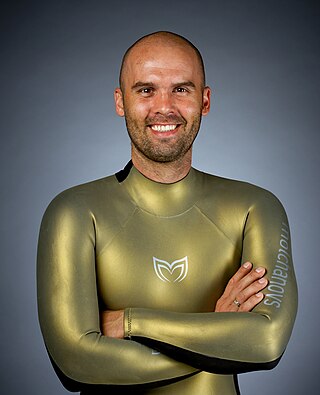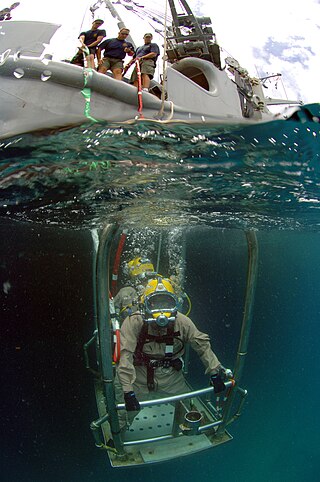Related Research Articles

Diving is the sport of jumping or falling into water from a platform or springboard, usually while performing acrobatics. Diving is an internationally recognised sport that is part of the Olympic Games. In addition, unstructured and non-competitive diving is a recreational pastime.

Drowning is a type of suffocation induced by the submersion of the mouth and nose in a liquid. Submersion injury refers to both drowning and near-miss incident. Most instances of fatal drowning occur alone or in situations where others present are either unaware of the victim's situation or unable to offer assistance. After successful resuscitation, drowning victims may experience breathing problems, confusion, or unconsciousness. Occasionally, victims may not begin experiencing these symptoms until several hours after they are rescued. An incident of drowning can also cause further complications for victims due to low body temperature, aspiration, or acute respiratory distress syndrome.

Freediving, free-diving, free diving, breath-hold diving, or skin diving, is a mode of underwater diving that relies on breath-holding until resurfacing rather than the use of breathing apparatus such as scuba gear.
Human swimming typically consists of repeating a specific body motion or swimming stroke to propel the body forward. There are many kinds of strokes, each defining a different swimming style or crawl.

Dräger is a German company based in Lübeck which makes breathing and protection equipment, gas detection and analysis systems, and noninvasive patient monitoring technologies. Customers include hospitals, fire departments and diving companies.
Freediving blackout, breath-hold blackout, or apnea blackout is a class of hypoxic blackout, a loss of consciousness caused by cerebral hypoxia towards the end of a breath-hold dive, when the swimmer does not necessarily experience an urgent need to breathe and has no other obvious medical condition that might have caused it. It can be provoked by hyperventilating just before a dive, or as a consequence of the pressure reduction on ascent, or a combination of these. Victims are often established practitioners of breath-hold diving, are fit, strong swimmers and have not experienced problems before. Blackout may also be referred to as a syncope or fainting.

Swimming lessons are the process of learning to swim. In most countries there is a definition of a number of swimming levels that are reached in the process of the curriculum. The respective certificates of swimming tests are required for further training in aquatic abilities. Many countries have defined a minimum swimming level that children should reach by the end of primary education, in most cases with the help of school swimming classes being part of the normal curriculum.

Natalia Vadimovna Molchanova was a Russian champion freediver, multiple world record holder, and the former president of the Russian Free Dive Federation. Described as "possibly the world’s greatest freediver," Molchanova set an unparalleled standard in the sport. She believed, “Freediving is not only a sport, it is a way to understand who you are,” reflecting her deep connection to the sport. Throughout her career, she achieved 42 world records and earned 22 world championship medals, 19 of which were gold.

Herbert Nitsch is an Austrian freediver, the current freediving world record champion, and "the deepest man on earth" having dived to a depth of 253.2 meters.
CMAS one-star scuba diver is the entry-level diving certification for recreational scuba diving issued by the Confédération Mondiale des Activités Subaquatiques (CMAS).
Deborah Andollo Lopez, also known as Deborah Andollo, is a Cuban free-diving athlete who held several world records in different disciplines. In 1996, she set a free-diving record of about 357 feet. On the "AIDA website’s world record history in both constant weight and No-Limits. In 1996 she excelled in constant 61 metres (200 ft) and no-limits 110 metres (360 ft), and did 100 metres (330 ft) in variable weight in Italy.

Alexey Molchanov is a Russian champion freediver, multiple world champion, world record holder, and freediving promoter. He is also president of the "Freediving Federation" association, head of freediving school named in honor of Natalia Molchanova, and designer and engineer of the freediving equipment brand Molchanovs. Alexey is a son of Natalia Molchanova – multiple champion and world record holder in freediving.

The German rescue swimming badge is awarded by the Wasserwacht of the German Red Cross, the DLRG and the ASB for proficiency in rescue swimming skills. The German rescue swimming badge is awarded in bronze, silver, and in gold. The awards is available as a cloth patch, as a metal badge, or as a ribbon. The rescue swimming badges in silver and gold are permitted to be worn on uniforms of the Bundeswehr, the German Police and various rescue services as a ribbon. It is also an entry-requirement for some German Police agencies.
The Dutch Military Proficiency Badge is a military badge offered by the Royal Netherlands Army.
The German snorkeling badge is a badge awarded for proficiency in snorkeling. It functions as a preparation for scuba diving certification courses. The badge is awarded either by the DLRG or the Wasserwacht of the German Red Cross.
Maurice Fernez was a French inventor and pioneer in the field of underwater breathing apparatus, respirators and gas masks. He was pivotal in the transition of diving from the tethered diving helmet and suit of the nineteenth century to the free diving with self-contained equipment of the twentieth century. All Fernez invented apparatus were surface-supplied but his inventions, especially his mouthpiece equipped with a one-way valve, inspired the scuba diving pioneer Yves le Prieur. He was also a talented businessman who created a company to manufacture and sell the breathing apparatus he invented, and expanded its range of products to include gas masks, respirators and filters.
Underwater orienteering, also known as scuba orienteering is an underwater sport that uses recreational open circuit scuba diving equipment and consists of a set of individual and team events conducted in both sheltered and open water testing the competitors' competency in underwater navigation. The competition is principally concerned with the effectiveness of navigation technique used by competitors to swim an underwater course following a route marked on a map prepared by the competition organisers, a compass and a counter meter to measure the distance covered. The sport was developed in the Soviet Union during the late 1950s and is played mainly in Europe. It is known as Orientation Sub in French and as La Orientación Subacuática in Spanish. Historically, the sport has also been known as Technical Disciplines.

The following outline is provided as an overview of and topical guide to underwater diving:

Nataliia Zharkova is a 2017 freediving champion of Europe and Ukraine. Zharkova holds multiple records in the discipline of freediving. She was also a freediving runner-up champion of the world in 2013. She is the first Ukrainian and the second woman to ever dive below the arch of the Blue Hole vertical underwater cave in Dahab, Egypt, on a single breath.